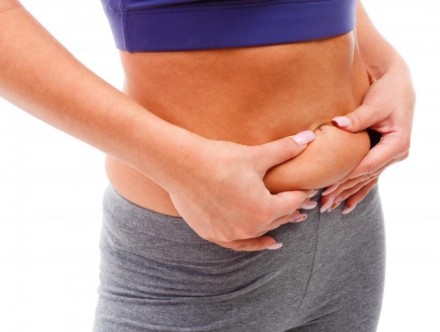July 31, 2013 | Marie Spano
Have you ever been frustrated by your weight? You cut your calories, log your food intake and diligently work out, sweating through spin classes and hammering it the weight room. But your fat isn’t budging, and the mirror doesn’t lie. Maybe it’s your thyroid or one of those obesity hormones? Nah. Chances are you can’t blame your hormones or even a sluggish metabolism (sorry).
The majority of people who are frustrated with their progress are making one or more of the following five nutrition mistakes.
1. You Take Cheat Days
If you are slashing calories and eating “clean” (healthy, less processed foods) five or six days per week, shouldn’t you be allowed one cheat day? No! Aside from the fact that I hate the term “cheat day” (because it implies an allowed eating binge after days of dietary deprivation), cheat days (and even cheat meals) can literally cheat you out of achieving results. While diligently watching your food and beverage intake and eating enough to fuel your body but also lose weight, a cheat day can tip you over your calorie budget for the week so your fat doesn’t budge one bit.
Here’s an example. I had a client years ago who ate about 1,500 calories every single day during the week, but he wasn’t losing weight. So I asked him to bring in his food log for the weekend. Beer, hot dogs, sausage, chips and more beer later. I calculated Saturday’s tally at over 4,500 calories. He really only needed about 1,800 calories daily to lose one to two pounds each week. That means his Saturday added up to an additional 385 calories per day for the week (and this doesn’t even include his diet disasters on Sundays).
If you want to eat something “off your diet,” go right ahead, but do so in a smart, portion-controlled manner instead of blowing it out. (Don’t cut calories or deprive yourself of everything you enjoy to avoid the need to blow it out!)
2. You Skip Breakfast
I’ve heard every reason in the book for why people skip breakfast. However, a wealth of research data supports breakfast and weight management. And it makes sense. If you feed your body first thing in the morning, you will have the energy you need to train hard; and the harder you train, the more calories you burn. Plus, you won’t search for snacks after dinner because you’re still hungry. Keep your stomach full and hunger pangs at bay by eating your morning meal.
3. You Don’t Feed Your Muscle
When you lose weight, you lose fat, muscle and a little bit of bone. So, your diet should be designed to maximize fat loss while minimizing muscle losses (a small amount of bone loss is normal with major weight loss).
As my colleague Sarah Snyder, MS, RD, CSSD, CSSD, USAW, says, “you have to feed the muscle to keep the muscle.” How do you feed it? With protein. Eat at least 30 grams of protein at breakfast, lunch and dinner (and post-workout) to maintain your muscle as you lose weight.
Ramping up your protein intake is especially important if you are cutting calories. The fewer calories you consume, the more protein to keep your muscle while losing fat. If you track your food intake, aim for at least 0.68 grams of protein per pound of bodyweight per day. (Note: this is a minimum—you still need 30 grams of protein per meal.)
4. You Aren’t Eating Enough
You actually have to eat a decent amount of food at each meal so you can subsist on fewer calories per day without obsessively thinking about food. A 220-calorie frozen dinner won’t cut it, because it won’t keep you full for an extended period of time. Make sure you get at least a quarter of your total daily calories at each meal. And fill up on high volume foods like non-starchy vegetables.
5. You Are Compensating for Calories Burned
I wish I had a dollar for every time I heard this: “but I burn 800 calories on the elliptical machine every night.” No you don’t. Disregard the calorie reads on machines or what your spin coach or group exercise instructor tells you that you are burning during class. Most people burn significantly fewer calories than they think they burn. They overestimate their calorie burn and underestimate how much they eat. If you think you are burning 800 calories a class (if you are a 300-pound, muscle-packed linebacker working your tail off, you actually might be), you are more likely to allow yourself that extra treat at night or a few more calories every day.
So, the next time you start to question your metabolism, take a Dr. Phil (honest) look at everything you are doing, track your calories every single day and, if you still can’t lose weight, have a registered dietitian (RD or RDN) look over everything you are doing, and if need be, talk to your medical doctor.
Source: http://www.stack.com/2013/07/31/why-cant-i-lose-weight/


